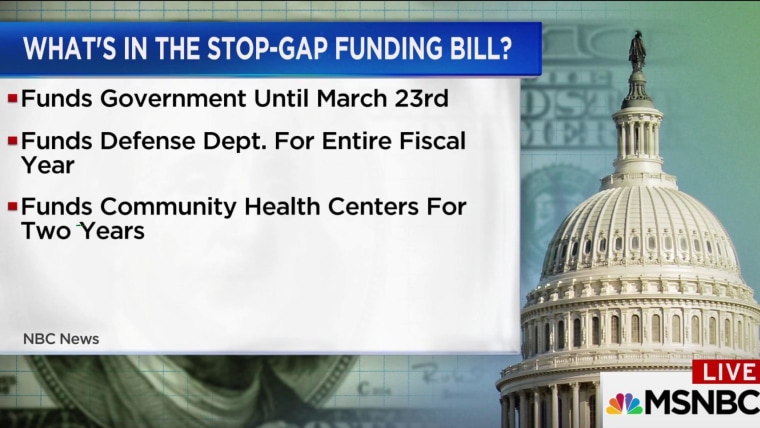WASHINGTON — The next short-term government funding bill is set to run out Thursday and Congress is poised to pass a fifth stop-gap funding bill to keep the lights on.
The latest deadline looms as a deal on DACA, which in part forced the last government shutdown, has yet to emerge that will get the support of the White House.
The run up to this congressional-imposed deadline is expected to lack the drama of the last funding date three weeks ago because neither party wants to repeat the three-day government shutdown, but nothing is yet certain as negotiations are still ongoing.

The House is expected to vote on their version Tuesday. It would extend government funding until March 23 but fund the Defense Department for the remainder of the fiscal year, which would appease the conservative Freedom Caucus and defense hawks.
It would also fund community health centers for two years, which is something the Democrats have been demanding. It's unclear, however, if the Senate would support the House measure.
But House Democratic Leader Nancy Pelosi was critical, calling Republicans "incompetent."
“Republicans control the House, the Senate and the White House but they have to rely on five stop-gap spending bills in a row to keep government running? Republicans must stop governing from manufactured crisis to crisis, and work with Democrats to pass the many urgent, long overdue priorities of the American people," Pelosi said in a statement.
It's the continuation of a pattern of short spurts of government funding to give stalemated congressional leaders more time to work out a variety of issues, including top-line spending levels for the current fiscal year and how any increases in government spending will be paid for, if they will at all.
Thursday is also a critical marker in the debate on DACA. It's the date Senate Majority Leader Mitch McConnell, R-Ky., agreed to give negotiators to come up with an agreement to address Dreamers, the immigrants who illegally came to the U.S. as children. If no agreement is reached by Thursday, then McConnell agreed to bring up the issue for the Senate to add to with amendments.
A group of bipartisan congressional leaders, tasked by President Donald Trump, have been working toward a solution on DACA but appear no closer to agreement.
Sen. Dick Durbin, D-Ill., a member of that group, said he's not optimistic that a deal will be reached on DACA before Friday.
But he added on CNN’s "State of the Union" on Sunday, "I don’t see a government shutdown coming."
Senate Republican leaders left a meeting with McConnell Monday night saying that if no deal is reached and if the government stays open, then McConnell will bring DACA to the floor next week. But what the bill will look like has not yet been decided and it's likely to become an issue of contention as well.
Democrats and some others are hoping for a more pared-down bill that the Senate can build upon while conservatives and the White House want a more robust bill that would be more difficult to alter.

Sens. Chris Coons, D-Del., and John McCain, R-Ariz., introduced a bipartisan bill Monday that addresses DACA and border security, which they'd like to be the starter or "base" bill in the Senate.
Coons said in a conference call with reporters that the legislation is admittedly narrow but that it's a good middle ground and starting point.
He reiterated that Democrats don't support many components in the president's proposal, including an end to family-based immigration and changes to birthright citizenship. And Coons said he doesn’t back an idea being floated of giving DACA recipients a one-year extension.
"My concern is that now Senators are saying the fallback position should be almost literally doing nothing like a one-year DACA bill and a one-year border bill. This stands between those two poles," Coons said. "So this is a bill that I think should be our base bill. I don't think we should do anything less than what's in McCain-Coons, and it's my hope that in the next few days of negotiating we will do something more."
The McCain-Coons proposal is similar to a bipartisan bill in the House by Reps. Will Hurd, R-Texas, and Pete Aguilar, D-Calif., that would provide legal status for Dreamers and increase security on the border.
The White House already dismissed the proposal, however, calling it a "nonstarter."
"It's worse than Graham-Durbin, and it takes effort to make a bill worse than Graham-Durbin," a senior administration official told NBC News.
White House Legislative Affairs Director Marc Short said "a lot" would have to be added to the McCain-Coons legislation for it to be the Senate’s starting point.
"I think we'd advocate our framework to be the base bill," Short told reporters after a meeting in McConnell's office with White House Chief of Staff John Kelly.
Graham-Durbin is a proposal that attempts to address the four pillars Trump set forth. It provides a path to citizenship for about 1.8 million people eligible for DACA, allocates $2.8 billion for border security and the president's wall, ends the diversity visa lottery, and prohibits the parents of Dreamers from receiving citizenship but does give them protected legal status.
Trump tweeted Monday that any proposal that doesn’t include a wall is "a total waste of time."
Trump told Congress to come up with a legislative solution for Dreamers by March 5 or their protected status will expire. A court, however, has given some reprieve but also added confusion for DACA recipients, ruling that Trump couldn't end DACA.
A bipartisan group of senators, self-named the Commonsense Caucus, of which Coons is a member, continues to meet as well to hammer out consensus on immigration.